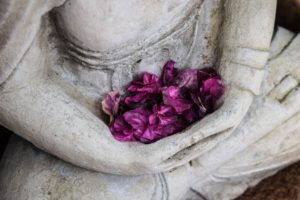The seed for this post was a podcast by Pat McCabe, also known as Woman Stands Shining, who is a Diné (Navajo) mother, grandmother, activist, artist, writer, ceremonial leader and international speaker. In the podcast, she speaks about the idea of making an offering as part of our spiritual work.
That idea started me thinking about offerings, what it means to make one, to whom we make them, and why. Spiritual and sacred practices are a strong theme in my Webbd Wheel series. Mother’s Day has come and gone and Father’s Day is ahead. Many of us mark these days with offerings of some kind. For Earth Day, I joined a small neighborhood group and picked up trash, and I framed that activity as an offering. Yesterday I cleaned up my summer-only dance space and danced there for the first time this season. As so often happens, during that hour of dance this week’s post crystallized.
An offering is “a thing offered as a gift or a contribution” according to a quick Internet search. A gift is “a thing given willingly to someone without payment.”
The act of making an offering is ancient, a practice we began long before we could go out and buy a gift. Various cultures have historically engaged in ritual sacrifice (an act of slaughtering an animal or person or surrendering a possession as an offering to God or to a divine or supernatural figure), an altogether different degree of gift from a cute coffee mug.
I’ve long struggled personally with gift giving. There’s something in me that resents and resists the cultural mandates we’ve created to give gifts of a particular kind on certain occasions or days of the year. It seems to me modern-day gift giving has moved away from making an offering and into a demonstration of possessing money and spending it on some new piece of something, just for the look of the thing. We may feel real love, or gratitude, or whatever, but the only way we know how to express it is by buying a card (never mind the trees) and some kind of a gift.
I know that’s how we do things, but what does it accomplish, aside from contributing to our capitalist economy? Is that what we most want from the people in our lives — more stuff — or is that what we take because we can’t get what we really want? Is a coffee mug all we think we have to offer? Is a coffee mug all we think the other will accept? Are we unable to recognize and cherish an offering unless it comes gift-wrapped?
I’m thinking a lot about Pele, the Hawaiian volcano goddess, because I’m writing about her in my second book. Traditional offerings to Pele included tobacco, brandy, silk, crystals, tropical flowers and food. Offerings to Pele and other divine figures around the world involved ritual, prayer, music, song, dance and sometimes a sacrifice. Things, yes, although many were consumables or objects from the natural world, but also time. Presence. Creative, sensual and/or erotic expression. Community celebration, guided by spiritual leaders. Reverence. Appreciation. Gratitude. Acknowledgement of the Divine’s connection to the people and the natural world they inhabited.
Making an offering on this level is a demonstration of commitment and willingness to participate in the complex web of connection between people and nature. It’s a practice, not a one-time event. It’s flexible and not limited to the calendar or the clock. If there’s a community or individual need to speak to the Divine, time is set aside to do so. No money or commerce need be involved, because the offering is of self.
The offering of self, however, is often invisible, especially to our nearest and dearest. It’s so fatally easy to take one another for granted. The very act of feeding those we love is an offering we’ve been making and accepting since humans began. The acts of growing, harvesting, gathering, hunting, sharing and preparing food, absolutely necessary for survival, are almost obscured now by money and time constraints, ecological concerns, health issues, ideology and who does the dishes. Whether we recognize it or not, feeding another person is an offering of life. Parents know making that single offering to just one child, let alone other family members, is a colossal, exhausting, unending task. Yet it’s so often completely invisible, and who has time to enjoy the act of offering food to another (or ourselves, for that matter), or incorporate ritual, play or creativity into our eating? It’s just another chore in our busy days.
So, if our offering is invisible, unrecognized, unappreciated or even rejected in favor of something like a coffee mug, does it mean we’re worth nothing, we are nothing?
Of course not, but it feels that way sometimes, doesn’t it?
Making an offering means letting it go into the world and having faith in its worth. An offering is a gift, and a gift is a thing given willingly, without payment, remember? There isn’t a scorecard. It’s the practice of offering that enriches our spirit, not the outcome. Unfortunately, everything about our modern culture trains us to depend on immediate reinforcement. We’re hooked on likes, claps and our stats. We gloat over the number of our friends, subscribers, comments and shares. Deadliest of all, we compare our popularity and performance with the popularity and performance of others.
What others think about us and how the world perceives us is becoming more important than our own integrity and the authenticity and quality of our offerings. We’re forgetting how to trust and have faith in silence, in invisibility and in not knowing. We’re forgetting our worth is not defined by others.
What about the offerings we make to ourselves? What about our ability to meet our own needs, spiritual, physical, creative and emotional? Do we have any self to give ourselves? Do we tell ourselves there’s no time, no money and no point? Do we tell ourselves whatever our self-expression is, it’s not worth anything, meaning we can’t sell it to someone or no one will approve of it?
I danced yesterday in an old woodshed that was attached to a local one-room schoolhouse more than 100 years ago. It leans and tilts. The roof leaks. The windows and doors aren’t square and the wind blows through gaps. I swept out the winter’s accumulation of mouse and bat droppings, leaves and dirt. It was a warm, sunny day and as I danced I gradually peeled off my clothes until I was naked. The sun came in the west window and made a square on the floor.
I thought of trees and stones offering their bodies to moss and lichen, the earth offering itself to plants, and blossoms offering themselves to sunlight and insects.
I thought of smiling into a stranger’s eyes and complimenting a cashier on the color of her blouse.
I thought of the creators of the music I was dancing to making an offering of their talent, enabling me to offer my dance.
I thought of homes, rooms and gardens I’ve created that are long erased. I thought of people I’ve loved with my whole heart and volunteer work I’ve done. I thought of my partner, who was running an errand in town so I could eat bacon the next morning. I thought of picking up trash on Earth Day and the new trash that’s been thrown out car windows since then, and how futile that makes me feel.
I thought about words, all these words, all these stories and ideas and thoughts in my head that are here and in my books. I thought about all the words written by others I read each day and appreciate and share.
I thought about procreation, the red tide and the milky seed our bodies offer to life, to hope, to continuance. I thought about offerings of tears, of blood, of pain, of rage and of surrender.
Offering is a circle. Life offers itself to us, and we can choose to offer ourselves to Life. What better offering can we make than our fully engaged participation and presence with ourselves, our experience and others? Such a gift can’t be bought or sold. It might not feed our fame, popularity or bank account. We probably won’t get validated by statistics or Twitter. Some people may never recognize or value it.
But our self-esteem will bloom. Our joy will increase. Our words and choices will add to the positive energy in the world. We will become self-empowered and spiritually strong and resilient.
I smiled and laughed and shouted as I danced, whirled and stamped and clapped. I offered up my white, winter-tender skin to the sun and air. A mosquito bit me on a knee; a blood offering. No one saw me, except maybe an astonished spider or two. No one cared. It was an offering of self to self, a private thing. It gave me joy. It gave my body a chance to move and be grateful. It fed my creative well.
It was nothing.
It was everything.
It was my offering.
All content on this site ©2018
Jennifer Rose
except where otherwise noted
© 2018 – 2022, Jenny Rose. All rights reserved.




I’m just catching up to this post now, a week or so late I suppose. This one really touches on so many things I’ve thought about recently–as recently as this morning, in fact, when the teen in my house started grousing about the nature of breakfast. Complaining about food that we are privileged to enjoy “without thinking about it” is something we should think about, clearly, and his lack of gratitude, although it’s kind of what he’s set up for at his age, is a surefire trigger for me, especially given all the daily ways I give to him. But it’s not just about the food, not just about him. It’s a cultural problem with how we give, as you point out. (I’ve received a few “coffee mugs” lately that were obviously meant to be appreciative gestures but revealed so much more about the giver than they ever were pertinent to my own desires or tastes). On the other side of the age/generational spectrum, I am frequently frustrated these days by my elderly father’s apparent need to spend money on things (especially random objects we don’t actually want or have space to accumulate) as a way of being in the lives of his family members. Generosity is an amazing quality, but what we want is more of him, not the things his money can buy. Oddly, he’d be among the first to understand this intellectually, and yet… I guess he spent so many years providing, working really hard within a traditional family patriarch role; some part of him must, in retirement, still be clinging to an idea of himself as valuable for the ways he can give things (objects or experiences) that are purchased. I will say, happily, there are also many times when I do receive exactly what I love: the investment of someone’s time and talents, given in order to cultivate a deeper connection. As for the flip side of what you write–how we feel about what we are giving when we are giving things like our skills and time and emotion, or even our worries on their behalf–especially if those things are not received well… also really resonates, but that’s a longer conversation. Maybe I’ll circle back on that sometime. For now: I think it’s great that you are dancing, wish you the most delicious bacon-filled breakfasts, and thank you for the offering of this post. 🙂
What amazing teachers our families are, especially during the period in which we find ourselves between our parents and our kids! I frequently wish I approached the stretching, growth and learning of that position with more grace and less grinding of teeth! Love is a strange journey, as a noun and a verb. I think this post represents a reminder to myself that, at the end of the day, pass or fail, seen or unseen, appreciated and loved or not, the offering of my true self is the best I have to give — and it’s enough. I find it easy to lose sight of that, and even easier to conclude that I’m an unattractive, inappropriate, disappointing nothing with nothing to offer anyone. That way lies despair, for sure. There’s a lot of truth in the old saying “it’s the thought that counts.” I try to be wide and wise enough to recognize that money and/or things are the best expression some of the people in my life have of their love for me. It’s heartbreaking, because as you experience with your father, I want something else entirely from them and I feel rejected by their inability or unwillingness to connect with me in deeper ways, but rejecting their offering to me in turn only doubles the hurt.
Not long ago I asked my oldest son, in total frustration, what, exactly he wanted from me. It was a great question. He had to stop and think. “Uhhh, well, what I’ve always wanted. Unconditional love, I guess.” The idiot has that, but his definition of unconditional love is that it’s without boundaries and limits on his behavior. Mine is not. It didn’t solve our conflict, but it was a very interesting little pause in the conversation, because I really wanted to know and he gave me the best answer he could. For a minute, we weren’t adversaries. I wish I’d thought to ask that question frequently during their teenage years. I wonder what they would have said, and how the answer might have changed over time. I wonder if they would ever have thought to ask me the same question? Probably not. Still, it’s interesting … Thanks so much for reading and commenting!